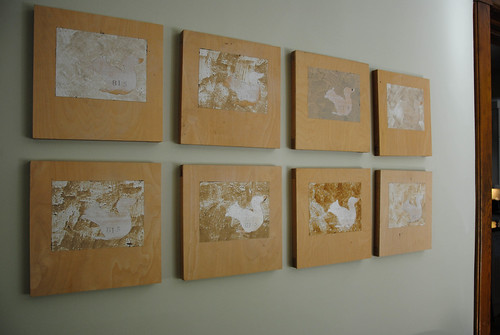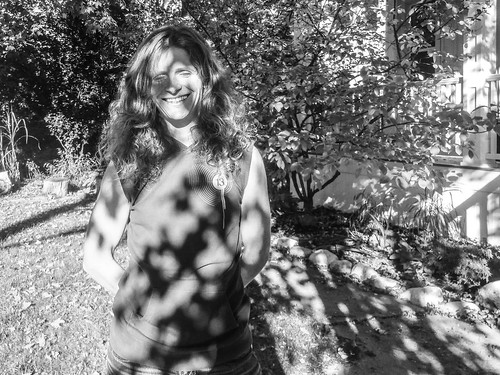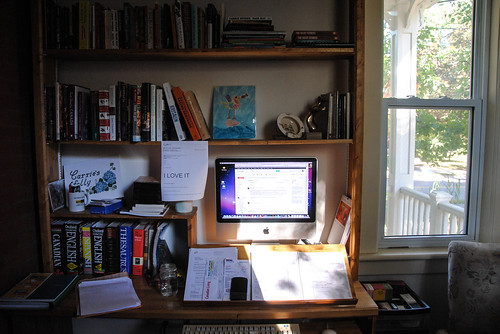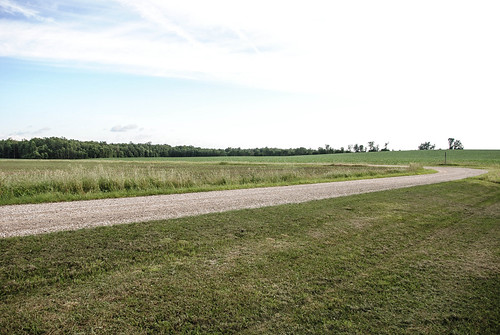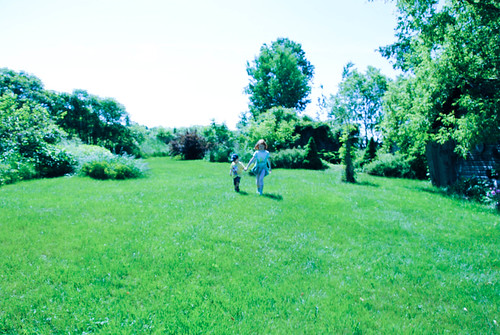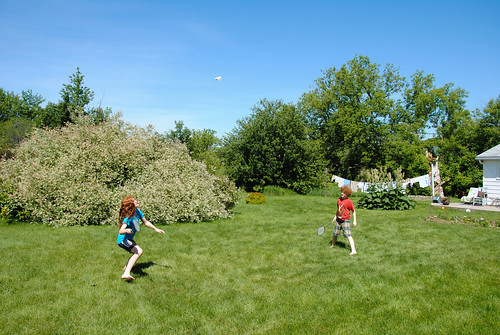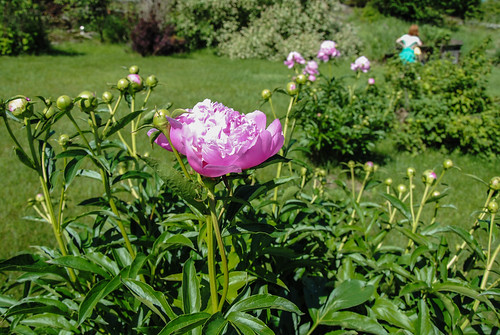Category: Money
Thursday, Sep 26, 2013 | Good News, Money, Work, Writing |

“squirrel-ducks” by Barry Lorne, newly hung in living-room
Good morning.
I’ve got news. I’ve got really big news. I’ve been sitting on this news for a few days because it’s the kind of news you have to share with family and close friends in person, and because, too, I needed time to process it, and because, honestly, it didn’t seem real.
It’s real.
Here is a milestone. X marks the spot. I stood in my living-room on Monday afternoon with the phone pressed to my ear, and it seems it was sunny, as I struggled to absorb what my agent was telling me: that we’d had a pre-emptive bid for my new novel, Girl Runner, from HarperCollins in the United States. The terrific editor to whom I’d spoken earlier that afternoon wanted to buy the book. Now.
Yeah. My agent had told me I’d want to be sitting down. I told her, no way, I’m too jittery, but she was right. I had to sit down. Then I had to tell Kevin before anyone else. I texted him to come home right now. The kids, who’d been listening in with interest in the background, had to wait, but Kevin hurried. Maybe he actually ran. (As there’d been a fair bit of whirlwind build-up over the previous week, he guessed what my news might be.) Albus was so excited he hugged me spontaneously. AppleApple wanted to take photos to mark the occasion.

it was really sunny
I felt weirdly calm.
And then there was supper to make, and swim team practice, and gymnastics, and by the time all of that was done, and the kids were tucked into bed, it was after 9, and Kevin, buzzing with excitement, was off to a soccer game. I was glad to see that he and the kids were excited, because I felt … well, I suppose it was shock.
It was the shock of a long-held dream becoming reality. In an instant. I couldn’t take it in.

I slept surprisingly soundly that night, and woke early to meditate. (Side note: so far, I’m really bad at meditating. My brain seems to think this is useful planning and organizing time, and it’s damn near impossible to get it to alight for more than an instant on my chosen mantra. But I won’t be discouraged!)
After a night of processing the news, and after my agent convinced me afresh that this was really happening, I was able to come around to two overwhelming emotions.
Relief. Gratitude.
I’m helping to support my family. I can see the burden lifted off of Kevin. It’s almost like something visible has been lifted from his shoulders. Most critically, and here is where relief and gratitude mingle most strongly: I’m getting to do what I love. That’s what all of this means. I’m going to sit here and write books. That’s all I want to do. I’m not even very good at much else.
I loved writing Girl Runner. My mind is already teeming with another book idea, although there are more edits and revisions to tackle first. I probably can’t quite comprehend what it will be like to be part of the publicity push to bring Girl Runner to an audience, especially in a new market. I’ve never even been to New York! I sound like a little country mouse. Maybe I am. But I’m ready. I’m more than ready. I’ve been working my whole life for this, and whatever comes, however it tips me sideways, lifts me up, knocks me down, challenges and changes me, my arms are wide open. My eyes are wide open. My mind is wide open.
You’ve been part of this, too, you know. All who’ve read and commented and emailed encouragement, support, worry, kindness. You’re here, too. Thank you.
Tuesday, Sep 24, 2013 | Birth, Books, Money, Publishing, School, Teaching, Work, Writing |

When I was growing up, I planned to be a writer. I would say that I dreamed of being a writer, but that’s not entirely accurate. I did dream of it, but not in the fantastical way I dreamed of owning a horse farm or of living in a straw bale house off the grid with a homeschooled brood of offspring. Instead, I planned for it. I would become a writer. I remember a very particular moment of clarity, in my parents’ house, in the bathroom (where as a self-absorbed teenager I spent many an hour gazing into the mirror), when I declared to myself that this was what I would do: I would write books.
I aimed myself at the goal with relative consistency after graduating from high school, though I floundered around a bit, seeking the right degree (theatre? music? playwriting? history?), and it took me until I was 19 (almost 20) to declare a major and work away at it like a person possessed: English literature, of course. At night, I would compose poems on my pre-Windows laptop, eyes closed, drumming out the day’s events through my fingertips and transforming the swerving emotions and experiences into imagery, metaphor, allusion, relishing the splendor of language.
I am often asked for advice on how to become a writer. Write, is what I say. And read. Write because you love to. Write what you love. Write as often as you can, doesn’t matter what: dream journal, cooking blog, poetry scribbled in the margins. And read read read for the love of it, too.
Reading for a degree in English literature can kind of kill the love, for a few time-crunched years, pencil clutched to underline key sentences and scribble down themes for future essays and exams. Nevertheless, reading widely, reading work you wouldn’t otherwise be exposed to, can only be a good thing in a cumulative way. I finished the degree, applied for grants, and went happily off, like a heat-seeking missile, to do graduate work, also in English literature. I was thinking I would do a doctorate and secure myself a job. But things were looking pretty grim for doctoral candidates in English literature back then, and I swiftly grasped that there was only one valid reason to go on in my studies: if I really loved it, then yes, I should. Otherwise, it was time to thank academia for my two excellent degrees, and figure out how to become that writer I’d planned to be.
Skip ahead. Skip over the boring bits, the hours and days and months and years spent writing and reading, and, of course, believing. At the age of 29, my first book was published. It took another eight years to write a second book worth publishing. By that point, I’d lived out the reality of being a writer. I’d been home with young children for years. I’d found paid work here and there as a freelancer and “mommy blogger,” which afforded me babysitting, which afforded me writing time.
I kept circling around the question: do I want to be a writer?
Wrong question, as it turns out; misleading, distracting. I already knew the answer: yes, I wanted to be a writer, and had proven that I could be. The real dilemma, the one much harder to face, and more personally painful to articulate, was whether I wanted to continue being a practicing writer if I couldn’t make a living at it. And the answer to that, I began to recognize, was no.
Last fall, I decided to switch career paths. I applied to midwifery school. (I also worked frantically on a new novel, feeling the urgency of time ticking down.) This wasn’t a decision taken quickly or lightly. I knew what it would mean: I wouldn’t be writing books, at least for the length of the degree, possibly longer. A book is the product of time and space and does not simply appear in a burst of inspiration; it’s a long-term gamble, is what it is. That’s what being a writer is, too. And my appetite for gambling was waning. This does not seem strange to me. The timing seemed ripe for a change. My youngest would be going to school full-time. I’d put my eggs in one basket for two decades, practicing a particular craft, gaining experience and technical skill, and earning praise from peers, without ever making a living at it. In most professions, this would be a bizarre and depressing outcome: imagine a doctor with two decades of training being unable to earn a living. It would be a sign of personal failure; this would have to be an exceptionally bad doctor. But in the arts, it’s practically expected, and we all understand that, even if we don’t speak openly about it. It’s the price of admission. You get to be a writer, but it’s for love, not money.
I love writing. But I wanted to support my family. I wanted to give us some stability, to take the pressure off my husband as sole provider, and, yes, to experience the reward of working in exchange for a paycheque. It was time to a get a job-job (or, more precisely, to train for a new career). I was excited and I was ready for a change — eager, even.
And then the novel I’d been working on sold here in Canada. This happened literally on the very same day I received my acceptance letter from midwifery school. I was kind of a mess.
It felt like the intersection of two possible lives. In one, I was a writer, still doing work that would seem relatively unstable to anyone with a job-job, but many steps closer to earning a living. In this version, I would be building on the foundation I’d worked so hard to lay. In the other possible life, I was starting from scratch, a student in the process of becoming a midwife, also a long-held dream. The decision was agonizing. It took weeks of “discernment” (read: long circular conversations with friends and family; thanks, friends and family), and I questioned myself repeatedly after turning down my place in the program. But there was fresh work to be done. I rolled up my sleeves and revised my new novel. I prepared for my first teaching job.
Summer trundled by. I loved sitting my office and working all day. It felt right, as it always has. It feels right.
At last year’s Wild Writer’s Festival, I was on a panel that included Alison Pick, and she was talking about her decision to work as a writer. She recalled that she’d just been hired at a job-job when her first book sold, so she was able to turn down the job-job and keep writing, and she’s never looked back. Every time she’d start thinking, uh oh, I’m going to need a job-job, something new would come along.
As far I’m concerned, that’s living the dream. Keeping at bay that wolf at the door.
So I’m publicly updating the plan I had as a teenager staring at herself in the mirror. Seems about time. What I’m planning seems no more unlikely, delusional, or ambitious than the original dream, which was, I’ll be the first to admit, highly unlikely, delusional, and ambitious. So here goes. Dare I say it out loud? I want to be a writer whose living is sustained by her writing. I want to be a writer who keeps getting to sit in her office and write, day in, day out, day in, day out. Oh, the places I’ll go in my mind.
Monday, Aug 26, 2013 | Feminism, Kids, Money, Mothering, Parenting, Spirit, Work, Writing |

Hi there. For some reason this old blog post, titled “Where mom-at-home meets working-mom” has gotten a ton of hits this week, so I went back to re-read it, and found myself entirely drawn in to the conversation (if you go to read it, too, definitely read through the comments).
It was originally written in October, 2011: nearly two years ago.
I was asking myself some tough questions.
**When I unpeel myself from them [my kids], who am I? **Who am I outside this home? And the question I’m most scared of, the one I really want to ask: **How do I begin to develop my working self, now, after a decade of being mom-at-home?
It’s funny how these questions have answered themselves. The good fortune of having The Juliet Stories recognized danced me outside of the house, and unpeeled me from them. And it turns out that the answer to those questions is: I’m pretty much exactly the same person, except in nicer clothes (maybe: ask my stylish daughter).
What about this question: How do I begin to develop my working self, now, after a decade of being mom-at home?
Now there’s a tougher one. Clearly, my career has developed in the past two years. I have publishing contracts for two new books, essays in three upcoming anthologies, and a new teaching job. I field regular invitations to do readings and host literary events. That said, it’s not a career that involves full-time hours and the corresponding full-time pay. It’s a pretty insecure career, built around a constant flow of push and energy that must be generated by me alone. Funny, kind of sounds like parenting. Turns out that my working self is not all that removed from my mom-at-home self. Both roles have developed and changed, but it’s not like one cancels out the other. Maybe my original question framed it wrong: it’s not either/or. How could it be?
What’s gotten cancelled out is other things I didn’t expect. I miss my playgroup, meeting up with other women once a week — the regular, routine warmth and connection that I have yet to replace. I rarely bake anymore, and haven’t canned a thing this summer; probably won’t. I don’t have the energy, even if I had the time. We now have a dishwasher and I drive much more than I’d like to, ferrying older children to extra-curriculars. I’m alone a lot, which I relish and appreciate (it is essential to my work), even while missing contact that can’t be replaced by social media. Oddly, the thing I thought I’d miss — full-on time with my children — I don’t, because, as it turns out, we still share a ton of activities, scheduled and unscheduled. You never stop being a parent, no matter what else you might be doing.
But here’s a confession: this past winter, I tried to find a traditional job. You know, a job-job. This is an insurance town, so most of the openings were inside insurance companies. We were going through a tough financial spell, and my writing career had never seemed more risky and indulgent. I sent out a dozen resumes. I received one reply. ONE. It was a no-thank-you, but I was grateful even for that. The worst thing about the experience was discovering that I wasn’t even qualified for jobs I didn’t want, let alone jobs I did. Thankfully, we got through the very bad month and the slightly-less-bad next month, and our fortunes steadily improved again. But the fear lingers: that if my family were to need me to find a job-job, to keep us afloat, I would be useless as tits on a bull, as my mother-in-law would say.
It’s been a decade since the famous (infamous?) “Opt-out revolution” article was published, interviewing women who’d given up promising careers to become stay-at-home moms. I’m not sure I gave up a promising career when I became a stay-at-home mom at the age of 26, but I had recently been promoted, and the opportunity to advance and develop within my chosen field of media / publishing / editing / journalism was there. I can’t remember whether I related to the women in the original article, but I remember thinking it was annoying, setting up this dichotomy between women, making it so either/or. Aren’t we all in this together, I thought?
I also thought, secretly, quietly, that there would be time for everything, and I didn’t appreciate being told that one choice might disadvantage me in another area of my life.
Recently, a follow-up article was published on those same “opt-out” women interviewed a decade ago: what had happened to them? (“The opt-out generation wants back in.”) Well, the economy had happened to them (all were American). Most had gone back to work, whether they wanted to or not; most had found it difficult to re-start their careers, and many had taken jobs that were below where they had been or could have been. Those whose marriages had ended were particularly disadvantaged and struggling. Few, however, expressed regret about their original choice. One woman struck me particularly — she had been in a traditional media job (like me), and found it virtually impossible to find work in a much-changed industry. The article ends with her landing an exciting job, after searching for several years, but at much less pay than she would have earned a decade before, only to have the project shut down six weeks later, and everyone let go. She was back to square one.
Let me tell you, I sure related to that article with a pang of recognition. Yet, I can’t feel regret, either. Because there are other interesting questions posed in my post, two years ago, questions that seem at least as significant, and more mysterious. I can’t answer them, especially the last one, but that’s why they’re so fascinating.
**Where am I heading, at my breakneck pace? **What am I failing to stop for? **What if I can’t squeeze every fascinating everything in? **What matters? **Will I always be so impatient? So goal-oriented? **Can I be both ambitious and content, or do those two states of mind cancel each other out?
Because it isn’t all about money, is it? If I look directly into my fear, and stare over the precipice of what would happen to my family were we thrown into financial crisis, and it were suddenly up to me alone to support us, I see many possibilities beyond disaster. I see family and friends. I see lifestyle changes and probably a lot of creative improvisation. I see a web of connections. We’re not without resources — I’m not without resources. That’s what I see, two years on, despite my recent experience of hunting for jobs I didn’t want and for which I was not qualified.
Because, I see, too, that I am already qualified for other jobs — ones I do want. This work might not offer the same security and stability, but maybe that just keeps me a step closer to reality. Stability is an illusion anyway, as we all secretly know.
It’s a gift to be doing what I love. I love being a mother. I love writing. I love thinking things through. My hope for myself, now and future, is that every time I doubt or question, I return to this: gratitude.
Tuesday, Jun 11, 2013 | Money, Spirit, Work, Writing |

Opened the fridge this morning, looking for an egg, and suffered a flicker of regret at turning down a new career path (ie. midwifery; perhaps the egg twigged it). I remember blogging last winter about wanting to escape out from under the expectation that my writing would need to earn a living (even a modest living) — a sweet dream of writing for pleasure, while pursuing work that would be very different indeed. I blogged about the writer’s cycle of survival, which involves filling out many application forms, a cycle that feels like one is perpetually asking for help. How exhausted I felt by the cycle. How I hated asking for help.
And yet here I am, several months on, willingly filling out more application forms.
It doesn’t feel like I’m asking for help, just now. It feels more like an elaborate gamble, which is how my writing life feels, in truth. My maternal grandfather was a gambler. He loved the horses. Like most gamblers, he probably lost more than he won, but he talked a big game. I think of myself as essentially cautious — hey, we’ve lived in the same house for a decade and I never try anything new with my hair — but that may be partly illusion.
When I consider the choices I’ve made in my life, the risks I can stomach, the hope I can generate against slim odds, the faith in the race, I’m not so far removed from my gramps. When it comes right down to it, I’m pretty much a gambler at heart. Or maybe it’s at gut rather than heart, the gut being the location of much of the gambler’s decision-making. It feels right, or it doesn’t. That’s as clear as it gets for me.
I have the gambler’s ability to look forward rather than back. Or elsewhere, rather than here. I separate myself into possibilities, hiving off rejection, stepping free from what isn’t to be with an energy that may flag but oddly doesn’t seem to deplete. I just finished reading Aleksander Hemon’s collection of essays “The Book of My Lives,” and he writes in his final essay something that rings true to my instincts, to what I know about why I write, too: “In my books, fictional characters allowed me to understand what was hard for me to understand (which, so far, has been nearly everything). I’d found myself with an excess of words, the wealth of which far exceeded the pathetic limits of my biography. I’d needed narrative space to extend myself into; I’d needed more lives. I’d cooked up those avatars in the soup of my ever-changing self, but they were not me — they did what I wouldn’t or couldn’t.”

My agent tells me, gently, that very few fiction writers survive on their writing alone; most have other jobs. I know this is true. I did very much want to develop a different and separate career, especially one with security, but the truth of it is that my writing hours are essentially full-time as it is, and I am also in the thick of it with my four kids, and there isn’t time or space or energy to add a third parallel life into the mix without sacrificing one or both of the other two occupations.
So I’m back to gambling.

But more precisely, I’m back to the imagination. This is a gamble both literal and figurative. I gamble every time I send a project out to be assessed, in hopes it will find favour and win support, and that process I could take or leave, quite honestly, except that I can’t and I won’t because it’s in support of the larger and more profound gamble to which I see I’m truly bound, and that is the wild, wonderful, risky, ever-creative, potentially illuminating, grace-filled gamble of making something from scratch, of writing more lives than I could ever live. How could I give it up? What wouldn’t I do to keep this gamble going?
It’s unsteady ground, and it has its practical limitations, as Hemon goes on to express heart-rendingly in the same essay, but it’s familiar. It’s known. I know here. I am suddenly reminded that I used to listen rather obsessively to Kenny Rogers’ “The Gambler” the summer that I was ten, and we were living with my aunt and uncle in Tennessee, before moving to Canada. “You’ve got to know when to hold ’em, know when to fold ’em, know when to walk away, know when to run. You never count your money when you’re sitting at the table. There’ll be time enough for counting when the dealing’s done.”
No counting shall I do.
Wednesday, Apr 3, 2013 | Blogging, Money, Running, Spirit, Spring, Work, Writing |


I walked CJ to the school bus this morning, and noticed our paired footprints on the way home. And that’s my teeny-tiny attempt at positivity regarding this January-in-April weather we’ve been “enjoying.” I run outdoors all winter long, and this morning’s run was one of the coldest all year, thanks to a bitter wind and sharp flecks of snow. I’ve also got a hole in my running tights, and I’d really like to retire them for the season. Yes, that’s a first-world-white-woman problem, right there.
What was I going to blog about? I had ideas.
A blog is a nice place to gather one’s thoughts, I find. Maybe that’s why I don’t really want to stop. There’s a scrapbook mentality to this blog: every day is different, but every day is also focused and structured by the necessity of being and expressing where I’m at right now.
I read a piece in Maclean’s this morning about meditation, about using our minds to come to terms with ourselves. That is totally not the quote. I’ll go get the magazine. Here it is: Meditation is “a dignified attempt to come to grips with being human with the resources you have right there. Not depending on some guru, or some drug, or some psychotherapy. Just a very simple technique that, repeated again and again and again, will eventually change the way you relate to the world at the deepest level.” The person being quoted is Jeff Warren, a Toronto meditation teacher and journalist, who sounds like he could be guru-like, but who doesn’t like gurus. I, too, distrust the guru figure, even while acknowledging that I can learn much from mentors and teachers … I think it’s a fear of idolatry, but maybe it’s a fear of dependence, too, because I also dislike self-help books, or anyone claiming to be able to fix anyone else’s life. And yet I feel myself drawn to writing a self-help-like book — collecting and distilling all of the bits and pieces of discovery that keep me going and keep me digging — which seems super-hypocritical. I’m simultaneously pulled toward looking for ways to find and express a more meaningful life, and resistant to latching on to a single path or expression. As an individual, my path is singular, my voice is singular, there’s no way around that. Maybe that’s why I like fiction: it allows me to embody and express a wide variety of opinions and beliefs, none of which may be exactly my own.
Back to Maclean’s magazine (awkward segue), I’ve discovered a new (unpaid) talent: writing letters to the editor. I rattled off a critique of their deliberately inflammatory headline a few weeks back, in which a screaming toddler was labelled with the question: “Is she a brat or is she sick?” Ugh, I thought. Stop it with the name-calling! She’s neither, of course: she’s a normal toddler. That’s the gist of my letter and they printed it.
As I put in a load of laundry this morning, I thought, I often write from a position of response rather than call. I react to what exists with emotion and opinion. The non-fiction essays I’ve written have almost all been assigned rather than originated and pitched by me. This has been a stumbling block to my freelance writing career. When I write an essay on an assigned subject, I never know where I’m going to end up, but I know it’s going to be a fascinating exploration of unexpected territory. I know also that these thoughts and discoveries wouldn’t exist without someone else inviting me to make them exist. It burns a lot of energy to come up with an idea and spin it into existence, all on my own steam. This may be my downfall, as a writer, my Achilles’ heel, the personality flaw impossible to overcome.
But that’s okay.
Because my goal is to make writing my comfort zone, my place of meditation and peace, and not my bread and butter. I’d like to stop complaining about not making money as a writer. (I’m sure you’d appreciate that too.)
I’d like to free my writing from the burden of earning.
I have a feeling that particular complaint will never vanish, no matter how long I work at writing. The tension between creativity and a comfortable lifestyle is built right into the artistic enterprise. I, personally, can’t imagine how to change the system so that creative energies are compensated in a steady and reliable way. I’ve tried! I just can’t imagine it. And while I’m appreciative of the important role grants have played in supporting my work, I really hate asking for money. Just hate it. I want to earn my living, plain and simple.
Wednesday, Mar 13, 2013 | Exercise, Lists, Money, Running, Writing |

I ran with a friend this morning. Therefore, I started my day feeling happy. Kevin says I should start every morning with exercise, and I agree, although I’m down to one early morning class due to cost and it’s a challenge to find free exercise that I feel safe doing, by myself, in the pre-dawn hours. I’ve been going to the nearby indoor track once a week, and I’ve got a yoga mat by the bed so I can start the morning with wake-up stretches. But the truth is that it’s so much easier to get up for exercise when a) I’m meeting someone or b) I’m signed up for something.
Find the fortitude, woman! (She says to herself.)
I am thinking about yesterday’s rant, and asking myself: what are the products/services that I, as a consumer, would have a hard time doing without. Because if I am honest with myself, I am a consumer, and lead a lifestyle that is by world-wide standards wasteful and decadent, even if I think (sometimes) that my family really does need the things we treat ourselves to. It’s hard to shake my fist at capitalism when I’m a willing participant.
These items make my list of really really really want ’em wants, for my family and for me:
* books, daily newspaper
* sports: team fees, shoes, clothes (thrifty or secondhand fine), exercise classes, swim lessons, swim suits, goggles, skates, helmets
* bicycles
* nice shampoo and conditioner
* eating out with my husband once a month
* eating out as a family once every two months
* our truck + gas; carshare fees
* vitamins and fish oil (expensive!)
* local food
* internet and cellphone
* our house and the cost of maintenance
* dogs and cost of keeping them
* prescription medication and dentist visits (we are both self-employed and pay out of pocket)
* piano lessons
* nursery school fees (until full-day kindergarten starts this fall, please dear God, if Tim Hudak isn’t elected in the meantime)
Do you have a list, too?
::
I woke up this morning remembering how last winter I couldn’t run for a whole month due to a hip injury. I remembered that not being able to run inspired me to find alternate ways to stay fit, including swinging kettlebells. I’m still swinging those bells once a week, for which my core is truly thankful. Look how straight I’m sitting at this desk! If I had been able to keep running, I never would have discovered this. Point being: what may look like a lost opportunity might actually be a gentle nudge in a direction yet untested. Point also being: in the past week, I learned that I failed to earn both grants applied for last fall; having earned both in the past, I know they’re within reach and I’m questioning why I applied proposing a secondary project that has sat idle since then, but, past results and hindsight aside, the fact remains that grants as a way of supporting my writing/list above are off the table for this fiscal year.
To quote a writer friend on Facebook: “The part of being a writer that requires the most creativity is figuring out how to pay the bills.”
